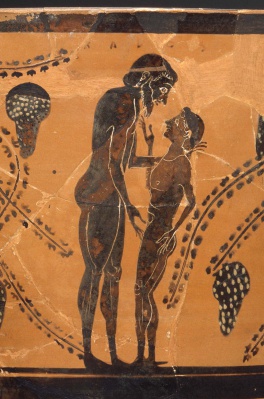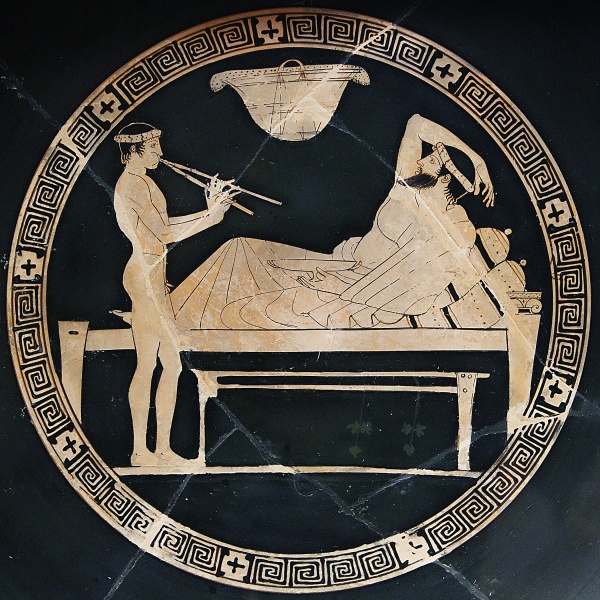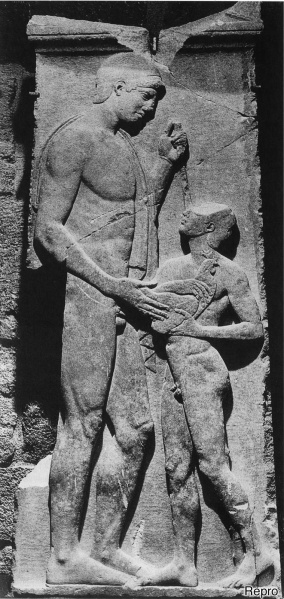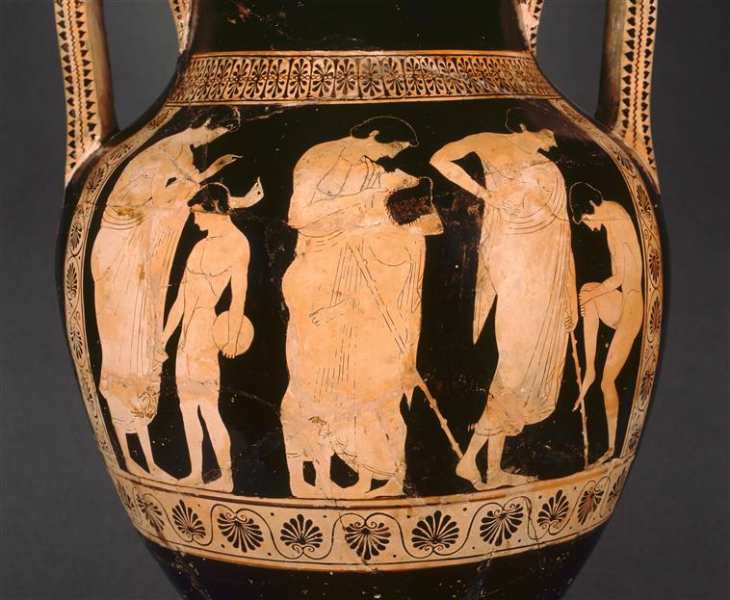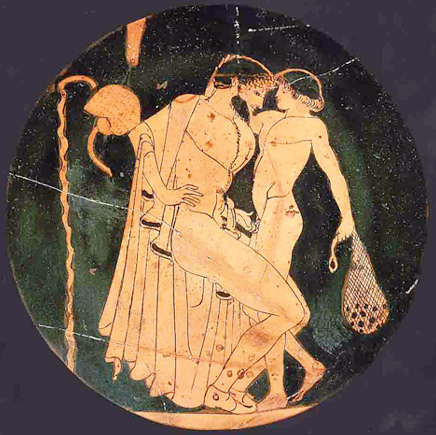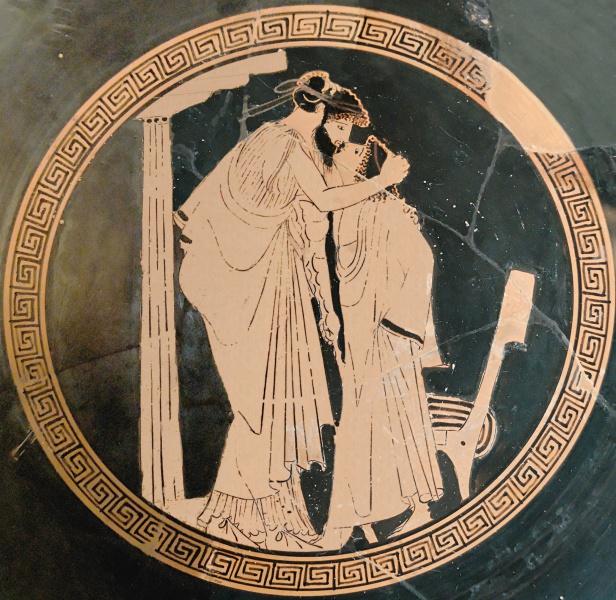Νόμοι για τα νεαρά αγόρια
Αρχικά, μνημονεύει την πρόβλεψη να μην ανοίγουν τα σχολεία πριν την ανατολή του ηλίου αλλά ούτε να παραμένουν ανοικτά μετά τη δύση του, καθώς το σκοτάδι αποτελεί σύμμαχο όσων εποφθαλμιούν τα νεαρά αγόρια (Κατά Τιμάρχου 9-10). Επίσης, τίθενται περιορισμοί στους επισκέπτες στα γυμναστήρια, όπου οι νεαροί Αθηναίοι προπονούνταν γυμνοί.
9. In the first place, consider the case of the teachers. Although the very livelihood of these men, to whom we necessarily entrust our own children, depends on their good character, while the opposite conduct on their part would mean poverty, yet it is plain that the lawgiver distrusts them; for he expressly prescribes, first, at what time of day the free-born boy is to go to the school-room; next, how many other boys may go there with him, and when he is to go home.
10. He forbids the teacher to open the school-room, or the gymnastic trainer the wrestling school, before sunrise, and he commands them to close the doors before sunset; for he is exceeding suspicious of their being alone with a boy, or in the dark with him. He prescribes what children are to be admitted as, pupils, and their age at admission. He provides for a public official who shall superintend them, and for the oversight of slave-attendants of school-boys. He regulates the festivals of the Muses in the school-rooms, and of Hermes in the wrestling-schools. Finally, he regulates the companionships that the boys may form at school, and their cyclic dances.
http://www.perseus.tufts.edu/hopper/tex ... ection%3D9
Σε περίπτωση που ο νόμιμος κηδεμόνας ενός νεαρού αγοριού το εξέδιδε έναντι χρημάτων, οποιοσδήποτε Αθηναίος πολίτης μπορούσε να τον καταγγείλει δημοσίως, αξιοποιώντας το θεσμό της «γραφής». Ως ποινή για ένα τέτοιο αδίκημα προβλεπόταν η απαλλαγή του παιδιού από την υποχρέωση να φροντίζει στα γηρατειά του τον κηδεμόνα του, ο οποίος το είχε εκδώσει έναντι χρημάτων (Κατά Τιμάρχου 13).
Ο νόμος, όμως, ήταν πολύ πιο σκληρός έναντι των προαγωγών. Όσοι ασκούσαν αυτό το επάγγελμα τιμωρούνταν με θάνατο σε περίπτωση που εξέδιδαν σεξουαλικά τέκνα ελεύθερων πολιτών (Κατά Τιμάρχου 14, 184).
13. Now after this, fellow citizens, he lays down laws regarding crimes which, great as they undoubtedly are, do actually occur, I believe, in the city. For the very fact that certain unbecoming things were being done was the reason for the enactment of these laws by the men of old. At any rate the law says explicitly: if any boy is let out for hire as a prostitute, whether it be by father or brother or uncle or guardian, or by any one else who has control of him, prosecution is not to he against the boy himself, but against the man who let him out for hire and the man who hired him; against the one because he let him out for hire, and against the other, it says, because he hired him. And the law has made the penalties for both offenders the same. Moreover the law frees a son, when he has become a man, from all obligation to support or to furnish a home to a father by whom he has been hired out for prostitution; but when the father is dead, the son is to bury him and perform the other customary rites.
14. See, gentlemen, how admirably this legislation fits the case; so long as the father is alive he is deprived of all the benefits of fatherhood, precisely as he deprived his son of a citizen's right to speak;1 but when he is dead, and unconscious of the service that is being rendered him, and when it is the law and religion that receive the honor, then at last the lawgiver commands the son to bury him and perform the other customary rites.
But what other law has been laid down for the protection of your children? The law against panders. For the lawgiver imposes the heaviest penalties if any person act as pander in the case of a free-born child or a free-born woman.
Εδώ κάνει λόγο για απαγόρευση του νταβατζιλικίου, πουθενά δεν γίνεται λόγος για απαγόρευση της παιδεραστίας απο έρωτα.
Νόμοι κατά των εραστών
Οι Αθηναίοι, επιδεικνύοντας την ευαισθησία τους για το σοβαρό αυτό θέμα, είχαν προβλέψει μια σειρά από ποινές για όλα σχεδόν τα αδικήματα που άπτονται των ομοφυλοφιλικών σχέσεων:
Σε περίπτωση που κάποιος δούλος παρενοχλεί ένα ελεύθερο αγόρι, τότε τιμωρείται με δημόσιο μαστίγωμα με πενήντα βουρδουλιές, (Κατά Τιμάρχου 139).
again, the same lawgiver said, “A slave shall not be the lover of a free boy nor follow after him, or else he shall receive fifty blows of the public lash.” But the free man was not forbidden to love a boy, and associate with him, and follow after him, nor did the lawgiver think that harm came to the boy thereby, but rather that such a thing was a testimony to his chastity. But, I think, so long as the boy is not his own master and is as yet unable to discern who is a genuine friend, and who is not, the law teaches the lover self-control, and makes him defer the words of friendship till the other is older and has reached years of discretion; but to follow after the boy and to watch over him the lawgiver regarded as the best possible safeguard and protection for chastity.
Γιατί μόνο ο δούλος; Ο ελεύθερος δλδ μπορεί να πηδάει;
Σε περίπτωση βιασμού το θύμα μπορεί να καταγγείλει το δράστη για βιαιοπραγία και τιμωρείται με χρηματικό πρόστιμο, το οποίο καταβάλλει τόσο στο θύμα όσο και στο κράτος
Για περιπτώσεις ασέλγειας, έναντι αγοριών οποιοσδήποτε Αθηναίος πολίτης μπορούσε να υποβάλλει μήνυση δημοσίως έναντι του δράστη και το δικαστήριο, κρίνοντας ανά περίπτωση, επέβαλλε την αρμόζουσα ποινή (Κατά Τιμάρχου 15).
15. And what other law? The law against outrage, which includes all such conduct in one summary statement, wherein it stands expressly written: if any one outrage a child (and surely he who hires, outrages) or a man or woman, or any one, free or slave, or if he commit any unlawful act against any one of these. Here the law provides prosecution for outrage, and it prescribes what bodily penalty he shall suffer, or what fine he shall pay. Read the law.
Nαι, σε περίπτωση βιασμού, και σε περίπτωση εκπόνρευσης. Αυτά.
Νομικές κυρώσεις για Ομοφυλόφιλους
Επικαλούμενος νομικές διατάξεις που αποδίδονται στο Σόλωνα, τον διάσημο αρχαίο νομοθέτη, ο Αισχίνης ευθαρσώς καταρρίπτει το μύθο της ομοφυλοφιλίας στην αρχαία Αθήνα!
Οι κυρώσεις που προβλέπει η αθηναϊκή νομοθεσία για όσους συνάπτουν ομοφυλοφιλικές σχέσεις είναι οι ακόλουθες:
Δεν του επιτρέπεται να γίνει μέλος των 9 αρχόντων.
Δεν του επιτρέπεται να εκλεγεί ιερέας.
Δεν του επιτρέπεται να είναι συνήγορος του λαού.
Δεν επιτρέπεται να ασκεί εξουσία εντός ή εκτός της Αθήνας.
Δεν επιτρέπεται να σταλεί ως κήρυκας πολέμου.
Δεν επιτρέπεται να εκθέσει γνώμη (ως άμουσος – ανισόρροπος).
Δεν επιτρέπεται να μπει σε (δημόσιους) Ναούς.
Δεν επιτρέπεται να στεφανωθεί στις στεφανοφορίες.
Δεν επιτρέπεται να μπαίνει στον ιερό χώρο της αγοράς. Όποιος λοιπόν έχει καταδικαστεί ως ομοφυλόφιλος αλλά ενεργήσει αντίθετα των διατάξεων του νόμου θα τιμωρείται με Θάνατο!
Pedagogical pederasty Those scholars who prefer the historical approach are convinced that pederasty originates in Dorian initiation rites. The Dorians were the last tribe to migrate to Greece, and they are usually described as real he-men with a very masculine culture. According to the proponents of this theory, pederasty came to being on the Dorian island Crete, where grown-up men used to kidnap (consenting) adolescents. It is assumed that this practice spread from Crete to the Greek mainland. In the soldiers' city Sparta, it was not uncommon when a warrior took care of a younger recruit and stood next to him on the battlefield, where the two bravely protected each other. Especially in aristocratic circles, pederasty is believed to have been common.
There are, indeed, a great many pictures on vases that show how an older lover, the erastes, courts a boy, the eromenos. They appear not to be of the same age: the erastes has a beard and plays an active role, whereas the adolescent has no beard and remains passive. He will never take an initiative, looks shy, and is never shown as excited. It is assumed by many modern scholars that as soon as the adolescent had a beard, the love affair had to be finished. He had to find an eromenos of his own.

 It was certainly shameful when a man with a beard remained the passive partner (pathikos) and it was even worse when a man allowed himself to be penetrated by another grown-up man
It was certainly shameful when a man with a beard remained the passive partner (pathikos) and it was even worse when a man allowed himself to be penetrated by another grown-up man. The Greeks even had a pejorative expression for these people, whom were called kinaidoi. They were the targets of ridicule by the other citizens, especially comedy writers. For example, Aristophanes (c.445-c.380) shows them dressed like women, with a bra, a wig and a gown, and calls them euryprôktoi, "wide arses". In this scholarly reconstruction of ancient sexual behavior, the older lover is presented as some sort of substitute father: he is there to help his beloved one on his way to manhood and maturity, and to initiate him in the customs of grown-up people. He showed his affection with little presents, like animals (a hare or cock), but also pieces of meat, a disk, a bottle of oil, a garland, a toy, or money. This type of love affair was, according to this modern theory, based upon (sexual) reciprocity.
http://www.livius.org/articles/concept/ ... sexuality/



